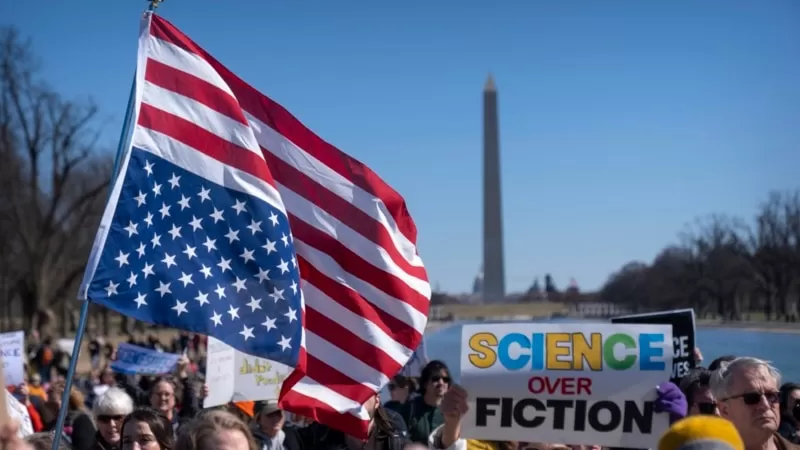WASHINGTON – As the saying goes, “knowledge is power.” And for scientists and researchers, that knowledge is the key to saving lives. However, in the first 47 days of the Trump administration, there has been a concerning trend of budget cuts, firings, and grant cuts in government agencies that fund vital research in health, climate, and other fields. This has sparked widespread outrage and concern among scientists, doctors, and their patients, who are now taking to the streets to stand up for science.
In the nation’s capital, a crowd of a couple thousand gathered at the Stand Up for Science rally, with similar rallies planned in over 30 cities across the United States. Politicians, scientists, musicians, and doctors all came together to make their case against the Trump administration’s actions, which they believe are not only endangering the future, but also the present.
“This is the most challenging moment I can recall,” said University of Pennsylvania climate scientist Michael Mann, as he addressed the crowd. Signs mocking the intelligence of President Donald Trump, his cost-cutting aide Elon Musk, and Health and Human Services Secretary Robert F. Kennedy Jr. were held up high. Mann added, “Science is under siege.”
Astronomer Phil Plait echoed this sentiment, saying that the United States is facing the most aggressively anti-science government in its history. The crowd responded with boos, showing their strong disapproval of the current administration’s actions.
Colette Delawalla, a doctoral student in clinical psychology and co-organizer of the rally, declared, “We’re not just going to stand here and take it.” This sentiment was echoed by science communicator and entertainer Bill Nye, also known as “the Science Guy,” who challenged the forces in government that are trying to cut and censor science. “What are you afraid of?” he asked.
Even U.S. Senator Chris Van Hollen joined in, urging the crowd, some of whom were dressed in white lab coats, to embrace the “mad scientist” label. “Everybody in America should be mad about what we are witnessing,” he declared, to which the crowd roared in agreement. And they have every right to be mad.
Signs held up by protesters read “Edit Elon out of USA’s DNA,” “Delete DOGE not data,” “the only good evidence against evolution is the existence of Trump,” and “ticked off epidemiologist.” These signs are a testament to the diverse group of people who came together to stand up for science.
The importance of science and research cannot be overstated. Health and science advances are happening at an unprecedented rate, and this is a crucial moment in history for making people’s lives better. Francis Collins, former Director of the National Institutes of Health who helped map the human genome, emphasized the risk that these funding cuts pose to progress in areas such as Alzheimer’s disease, diabetes, and cancer. “It’s a very bad time with all the promise and momentum,” he said.
Collins also expressed his concern for the country, before breaking out into an original song on his guitar. His message was clear – science should not be silenced or ignored.
Emily Whitehead, the first patient to receive a certain new type of treatment for a rare cancer, shared her powerful story with the crowd. At the age of 5, she was sent to hospice to die, but CAR T-cell therapy “taught my immune system to beat cancer,” and she has been disease-free for almost 13 years. “I stand up for science because science saved my life,” Whitehead said, highlighting the real-life impact of scientific research.
The rally in Washington took place at the Lincoln Memorial, in the shadow of a statue of the president who created the nearby National Academy of Sciences in 1863. This was a poignant reminder of the important role that science has played in shaping our country.
Even from 11 million kilometers away, NASA has shown that science can divert potentially planet-killing asteroids. Former NASA Administrator Bill Nelson shared this inspiring example with the crowd, also reflecting on his own space shuttle flight nearly 40 years ago. Looking down at Earth, he felt a “sense of awe” and a responsibility to be a better steward of our planet. This sentiment resonated with the crowd, who cheered him on.
The Stand Up for Science rallies were organized mainly by graduate students and early career scientists, who showed incredible passion and determination in their efforts. Dozens of

